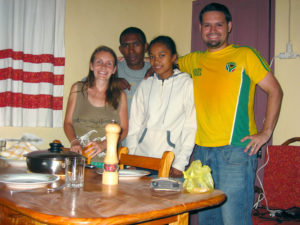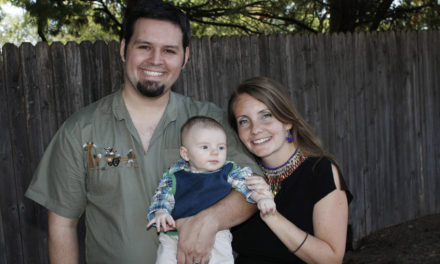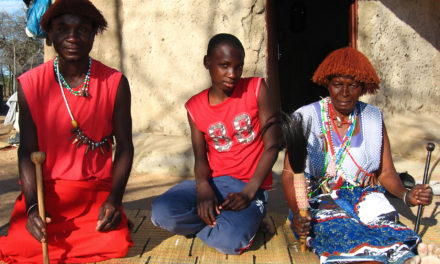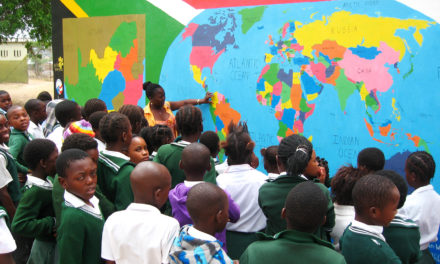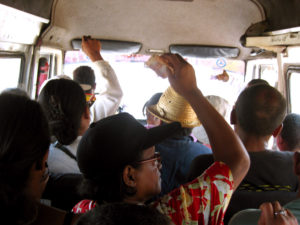
A standard “taxi be” (public transport van) in Madagascar. People are passing their money back to pay the driver… the standard fee is $.15 anywhere along the taxi be route.
After a long walk down a rugged dirt road, we arrived at the main road into town and climbed on a “taxi be.” At our old house here in Antsirabe, we were able to walk just about anywhere we needed to go because of its close proximity to the major markets. After our move to our new home, we regularly take the public “taxi be” for getting to the middle of town.
On this particular ride, as Adam and I were talking, a young man sitting in front of us for most of the way finally gathered up the courage to turn around and speak to us in his broken English. He was curious because he had been hearing us speak English and wondered where we were from and what we were doing here in Madagascar. We chatted until it came to our stop. He and his fiancée decided to get off at our stop with us so that we could talk some more. Since we had an appointment at that time, they asked if they could come out to our house and meet with us later that day.
That afternoon we had a nice time with our guests just getting to know each other a little bit. They told us how they started a high school called Wonderful College and how they teach English as one of their subjects. They said that they have an English Club every Wednesday that they would like us to teach. We explained that we are here to learn Malagasy and are quite busy with lessons but would be willing to teach at their English Club twice a month. Knowing how much they also wanted to practice their English personally, we made an arrangement with them: we would teach at their English Club, and once a week we would cook dinner for them and we’d all speak English and once a week they would cook for us and we’d all speak Malagasy. They were extremely excited about this exchange.
The relationship we’ve developed with them since them has become my highlight each week. I can freely express myself when we’re speaking English, which makes me feel more comfortable when fumbling around in Malagasy. This was the kind of reciprocal relationship we were craving when we were living in our first, very large, house. Less than a week after moving, taking the necessary transport into town from our out-of-the way house, we met our new friends. Little did we know that encounter on the taxi would be the start of a great friendship: meals shared, skills exchanged, families visited, and lots of great conversation.
This makes me wonder though: what if he had been too scared to talk to us that day on the taxi, too scared to use a language he doesn’t know very well? And I shudder to think how much we would miss by not having good friends to speak Malagasy with for hours every week. For their part, they not only enjoy their chance to develop their English skills, but they’ve also told us how great it is for them to be able to enjoy conversations with us in their own language, and that most foreigners they’ve known never got past the basic greetings in Malagasy.
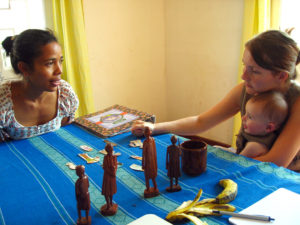
One of our first Malagasy language lessons – learning new words by sound and identifying the objects when our teacher, Fanja, says them.
We have been learning the Malagasy language for three months now. Our teacher uses a method that takes into consideration the way a child learns language. Our lessons began with listening to our teacher speak and pointing to objects before we even tried saying anything ourselves. Then came simple sentences and now we’re using more complex ones. At the end of these three months, I can honestly say that I already know more Malagasy than I did of the Shangaan language, and that was after living in South Africa for more than two years. Of course, our work in South Africa was intended to develop their schools, and that included their ability to teach all their subjects in English. So, that was a setback to our Shangaan language learning there, but I’m still amazed by how far we’ve already come in such a short time with the Malagasy language.
Yet even with all this knowledge, I’m still a child. There are so many words and expressions in my head that don’t seem to want to make their way to my tongue. I speak slowly and mispronounce words. People are eager to speak to us about anything and everything and all I can do is stare at them blankly many times and ask them to repeat. I often feel like Matimu who screams and cries when he wants something he can’t get to but he knows no other way to communicate it. Although I don’t throw a fit outwardly, I feel angry and frustrated inwardly. I’m an adult, yet so much like a baby, and I don’t want to be. Learning a language is a frustrating and humbling experience.

Matimu is learning more every day. Now he can scoot around in his “walker”, moving quickly to any part of the room he wants… we just have to watch our toes to make sure he doesn’t run over them!
As much as I want to jump to having fluid conversations with people, it just doesn’t happen that way. Aside from babbling, Matimu still doesn’t talk after eight months. Every day there is a new discovery for him and as the weeks pass, there are new tasks that he is able to do. And each step and new thing he learns is extremely necessary to his later development, something that we, as his parents, can celebrate. I can learn a lot from Matimu; that it’s ok to be a baby for now. I don’t see it or understand it now, but every new little thing we learn is necessary and important for our relationships and our work in the future.
This process is very difficult for me because I hate making mistakes and quite frankly it hurts my pride. Yet when I think of what Christ did for us and how he humbled himself unto death, well, it’s the least I can do. Christ asks us in turn to humble ourselves, to take up the cross and follow him daily. This is what it means to follow Christ, that in spite of fear and discomfort, in spite of feeling stupid, we sacrifice our pride for the sake of others, so that we can be His love in the world.
Learning a language is not just about being able to communicate with people, it’s about showing people that you care enough about them to take the time to learn, even if you sound foolish. And it’s not about what we can do, but what God does with our efforts. All he asks is that we give of ourselves and set aside our selfish ambitions so that he can work through us.
I’m so glad that our friends took a chance that day to speak to some foreigners on a taxi. A great friendship began because of their willingness to put themselves out there. Let us not be held back by our fears and insecurities, whatever they may be. Give what you can of yourself and let God do the rest “for it is God who is at work in you, enabling you both to will and to work for his good pleasure.” (Philippians 2:13)
In Christ,
Lora, Adam, and Matimu Willard

